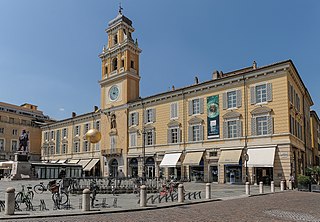
Parma is a city in the northern Italian region of Emilia-Romagna known for its architecture, music, art, prosciutto (ham), cheese and surrounding countryside. With a population of 198,292 inhabitants, Parma is the second most populous city in Emilia-Romagna after Bologna, the region's capital. The city is home to the University of Parma, one of the oldest universities in the world. Parma is divided into two parts by the stream of the same name. The district on the west side of the river is Oltretorrente. Parma's Etruscan name was adapted by Romans to describe the round shield called Parma.

Emilia-Romagna is an administrative region of northern Italy, comprising the historical regions of Emilia and Romagna. Its capital is Bologna. It has an area of 22,446 km2 (8,666 sq mi), and a population of 4.4 million.

Bologna Cathedral, dedicated to Saint Peter, is the cathedral of Bologna in Italy, and the seat and the metropolitan cathedral of the Archbishop of Bologna. Most of the present building dates from the 17th century, with a few parts from the late 16th century.
Mordano is a town and comune in Emilia Romagna (Italy), situated in the province of Bologna. The municipality is organized in two major villages: Mordano and Bubano.

Cadelbosco di Sopra is a town and comune in the province of Reggio Emilia in Emilia-Romagna, Italy.

Bagno di Romagna is a comune (municipality) in the Province of Forlì-Cesena in the Italian region Emilia-Romagna, located about 90 kilometres (56 mi) southeast of Bologna and about 45 kilometres (28 mi) south of Forlì.
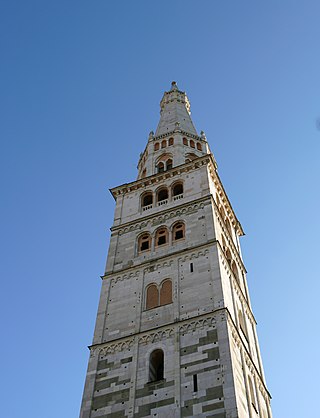
The Torre della Ghirlandina or simply Ghirlandina is the bell tower of the Cathedral of Modena, in Emilia-Romagna, Italy.
Emilia is a historical region of northern Italy, which approximately corresponds to the western and the north-eastern portions of the modern region of Emilia-Romagna, with the area of Romagna forming the remainder of the modern region.
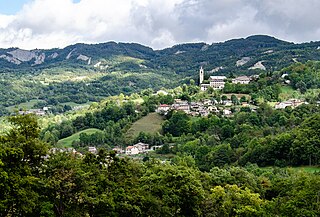
Fontanaluccia is a frazione of the comune of Frassinoro in the Province of Modena, Emilia-Romagna, central Italy.

Bologna is the capital and largest city of the Emilia-Romagna region in Northern Italy. It is the seventh most populous city in Italy, with about 400,000 inhabitants and 150 different nationalities. Its metropolitan area is home to more than 1,000,000 people. It is known as the Fat City for its rich cuisine, and the Red City for its red tiled rooftops and, more recently, its leftist politics. It is also called the Learned City because it is home to the oldest university in the world.

The Fiera di Bologna is the business district of the city of Bologna, in central Italy. The area includes a trade exhibition centre and several office towers occupied by the regional government of Emilia-Romagna and various private companies.

The Basilica of San Giacomo Maggiore is an historic Roman Catholic church in Bologna, region of Emilia Romagna, Italy, serving a monastery of Augustinian friars. It was built starting in 1267 and houses, among the rest, the Bentivoglio Chapel, featuring numerous Renaissance artworks.

San Martino church, also called San Martino Maggiore is a Gothic-style, Roman Catholic church located at the corner of Via Marsala and Via Guglielmo Oberdan in Bologna, region of Emilia Romagna, Italy. The church was founded by the adjacent Carmelite monastery. On 10 August 1704 via the authority of the Vatican Chapter, the venerated image of the Virgin of Mount Carmel was crowned by Pope Clement XI. On 25 August 1941, Pope Pius XII elevated it to the status of basilica.
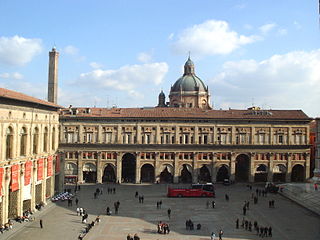
Palazzo dei Banchi is a Renaissance-style palace façade located on the eastern flank of the Piazza Maggiore in the center of Bologna, region of Emilia-Romagna, Italy.
The following is a timeline of the history of the city of Bologna, Emilia-Romagna region, Italy.

The Civic Museum of the Risorgimento is located in the ground floor of the Casa Carducci, located in Piazza Carducci 5, in central Bologna, Italy.
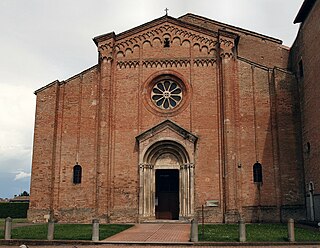
Fontevivo Abbey is a former Cistercian monastery in Fontevivo, Province of Parma, Emilia-Romagna, Italy, about 15 kilometres west of Parma on the Via Emilia towards Fidenza.

San Nicolò di San Felice is a deconsecrated Roman Catholic church located on via San Felice 41 in Bologna, region of Emilia Romagna, Italy. Bombardment during World War II caused sufficient damage to close the brick walled structure with a front portico.
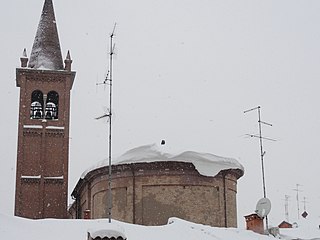
San Petronio is a Roman Catholic church located on Via Garavini #19 in the town of Castelbolognese, in the region of Emilia Romagna, Italy.

Santa Maria Assunta is Romanesque-style, Roman Catholic parish church located at Via della Chiesa in the frazione of Rubbiano, in the town of Montefiorino, province of Modena, in the region of Emilia-Romagna, Italy.

















